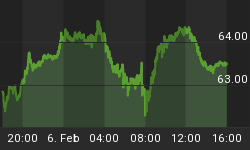2014: Growth Is Unimpressive

Economic data in 2014 has aligned with "slow, but still positive growth." It is easy to find blurbs in the press similar to the June 12 segment from The Wall Street Journal below:
Soft sales at retailers in May suggest U.S. consumer spending remains on a familiar trajectory of modest growth, further blunting hopes for a strong and sustained economic expansion this year.
1992: Growth Was Unimpressive
Those who have been following the markets for some time probably recall that it was easy to find "slow growth" stories in 1992. The excerpt below is from the February 1992 New York Magazine:
"If the economy doesn't quickly snap out of its lethargy and begin to grow respectably, the stock market could get whacked."
1992: What Happened Next?
As shown in the chart of the S&P 500 below, after the "stock market could get whacked" comments were published in New York Magazine, the S&P 500 gained 18% over the next 21 months. Looking out further from the date of publication, the S&P 500 gained 378% between late February 1992 and the spring of 2000.

But, We Are Trading Near An All Time High
In 2014, stocks are trading near an all time high, which is often cited as a reason not to invest. For the record, when New York Magazine published the article on slow economic growth in February 1992, the S&P 500 was trading near an all time high.

Stocks may or may not correct in 2014, but as the chart below shows those who tried to "wait for a better entry point" were left behind in a big way in 1992. Therefore, rather than basing our decisions on the admittedly concerning combination of slow growth and all time highs, we will continue to use the "pay attention and adjust as necessary" approach outlined in detail in The Most Important Thing For 2014.

1992 And 2014 Are Quite A Bit Different
No two periods in human or economic history are "the same"; a concept that applies to 1992 and 2014. The point is not to compare the periods head-to-head, but rather to illustrate the importance of keeping an open mind about better than expected stock market outcomes during periods of slow economic growth.
Slow Growth May Give Fed More Time
Just as assuming slow growth will doom the stock market, it is not prudent to assume the Fed is on the cusp of embarking on a stock-killing campaign to increase interest rates. From Reuters:
The International Monetary Fund cut its growth forecast for the United States on Monday and said the economy would not reach full employment until the end of 2017, allowing the Federal Reserve to bide its time before raising interest rates.
Investment Implications - Bears Need To Prove It
As outlined on June 13, our basic objective from a risk management perspective is to balance the need to "leave it alone" with the desire to "avoid losing 50% in the next stock market disaster." As outlined in this week's stock market video, the observable and unbiased evidence continues to side with the "leave it alone" camp, even in the context of recent unrest in Iraq.
Consequently, we made no allocation changes last week. We continue to have exposure to diversified U.S. stocks (VTI), leading U.S. sectors (XLK), and bonds (TLT). With the U.S. contemplating airstrikes in Iraq, we will continue to monitor the evidence with a flexible and open mind.















